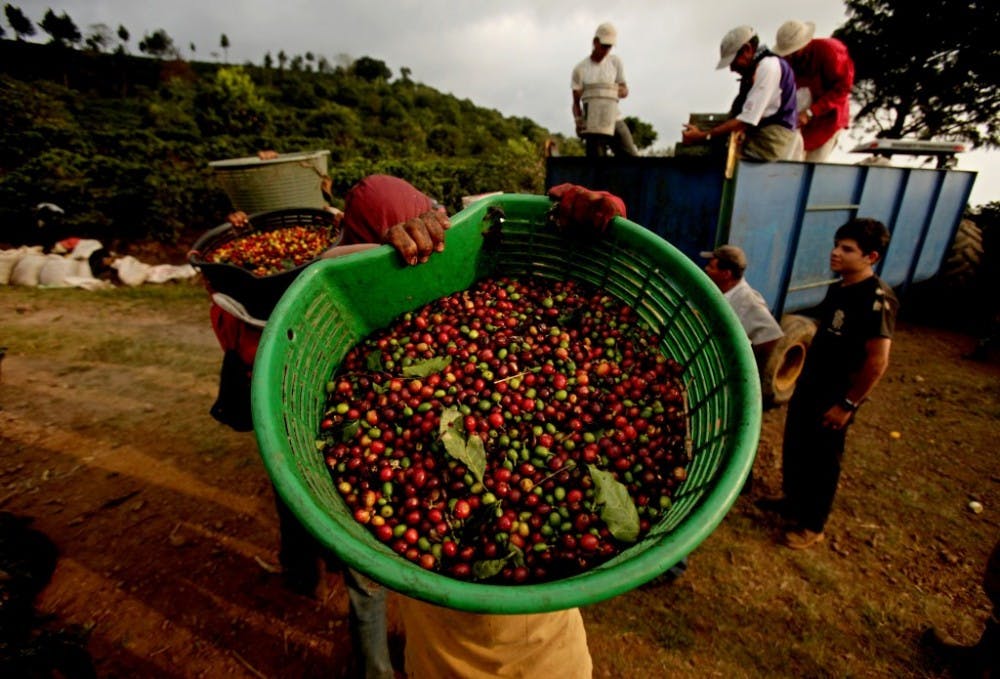In the United States, food is equivalent to social time, cultural events and celebrations. In order to eat fresh, healthy foods in the United States, it costs significantly more. The overly processed, high sugar concentrations and levels of fat and sodium are cheap, easy to make and taste good. There is a desire for instant gratification and convenience that often outweighs common sense about eating healthy. Food is rarely viewed as fuel, and people would rather live to eat than eat to live. The themes of rising obesity rates and the popularity of crash dieting is quite concerning for this generation.
[quote]Coffee is essential to Costa Rican culture. The pure, perfected art of selecting, drying and assembling the beans is an incredible phenomenon to witness.[/quote]
In Costa Rica, there are many cultural values that are different from those in the United States. It is common to eat fresh, healthy foods at a reasonable cost and is less popular and a lot more expensive to buy processed fast foods. It's also common to go to the supermarket every two or three days to get the food needed for a few meals. Food expires quickly because it is so fresh, so portion sizes tend to be much smaller. Places that sell things in bulk, like Sam’s Club and BJ’s, do not exist. Most Costa Ricans eat both breakfast and dinner at home.
“It has only been the last few years that people have eaten lunch outside of (the) home,” said Kathia Carmona, a host mom to an Elon student currently studying in San Jose.
People used to come home in the middle of the day to eat with their families. Costa Rica is much more of a collectivist culture than individualist. The values of families and the common community are often considered before promoting individual interests. People tend to value strong relationships above personal growth, wealth and success.
Elon students studying in Costa Rica have already been to both a coffee and banana plantation. Coffee and banana plantations are the most important. The bananas are hand-picked from the individual trees and begin the process they go through to reach the rest of the world.
“According to my host mom, (drinking) coffee for every meal is very Costa Rican,” said Elon student, Anthony Phillips Spencer. “My host family drinks a cup of coffee for every meal, even if it is with a glass of juice.”
Coffee is essential to Costa Rican culture. The pure, perfected art of selecting, drying and assembling the beans is an incredible phenomenon to witness. The roasting of coffee beans is what gives them flavor. It is common to ship their unroasted beans to companies like Starbucks and Dunkin' Donuts, who roast them to their desired style.
Fresh fruits are readily available and not too expensive. Some of the most common are pineapple, bananas, strawberries, guanabana, guava, papaya and watermelon. It is not uncommon to pay more at a store or vendor with whom one has established a personal relationship. It is not about quantity or maximizing profit as much as the enjoyment and perfection of the goods provided and the maintenance of a relationship between the consumer and vendor.
But there is also a desire to be more like the United States. Costa Rica is beginning to adopt American ways of life learned from television and film, and there are fast food influences on certain Costa Rican businesses. In a small section of San Jose, there is a McDonalds, Hooters, Taco Bell and Applebee’s.
“In the United States, we are so busy that we don’t have time to sit down and eat together,” said Elon sophomore Erika West. There is something to be said for taking the time to eat a meal with family members or friends. In an attempt to fit more things in the day, Americans skip out on quality time as well as quality food.
But globalization is occurring whether we like it or not. And before that happens, it seems there is a lot the United States can learn from Costa Rica.


